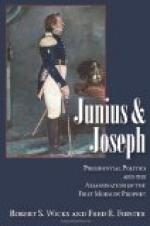“Come, friend Susannah,” said he, “I have been sent to bring you to witness my baptism,” and with that he turned and walked slowly down the path, as if waiting for her to follow.
Susannah, filled with surprise, watched him as he made slowly for the gate, as if assured that she would come. When he got to it he set it open, and, holding it, looked back.
She dropped the long folds of muslin, and they fell upon the floor knee-deep about her; she stepped out of them and walked across the old familiar living-room, with its long strips of worn rag-carpet, its old polished chairs, and smoky walls. The face of the eight-day clock stared hard at her with impassive yet kindly glance, but its voice only steadily recorded that the moments were passing one by one, like to all other moments.
Susannah went out of the door. The sun drew forth aromatic scent from the borders of box, and her light skirt brushed the blossoms that leaned too far over. Outside the wicket gate at which the young man stood was a young quince tree laden with pale-green fruit. Susannah let her eyes rest upon it as she spoke: she even let her mind wander for a second to think how soon the fruit would be gathered.
“Why should I come to see your baptism?” she asked, with her voice on the upward cadence.
The young man blushed deeply. “I am come to thee with a message from heaven.” He glanced upward to the great sky that was the colour of turquoise, cloudless, serene.
“It is a strange errand.” There was a touch of reproof in her voice, and yet also the vibration of awe-struck inquiry. Her mind rushed at once to the memory of Joseph Smith’s prophecy.
“Come, friend,” said the young Quaker very gently.
“I can’t possibly go.”
His strange reply was, “With God all things are possible.”
The text fell upon her mind with force.
“Come,” he said gently, and he motioned that he would shut the gate behind her.
“Not now; my shoes are not stout; I have no bonnet or shawl.”
“Put thy kerchief over thy head and come, friend Susannah, for ’no man, putting his hand to the plough, and looking back, is fit for the kingdom of heaven.’”
At this he walked on, and she was forced to follow for a few steps to ask an explanation. She tied her kerchief over her head and the thick white dust covered her slender shoes.
“What do you want me to come for?” she asked.
He looked upon her, colouring again with the effort to express what was to him sacred. “It has been given to me to pray for thy soul. To-day, as I prayed, it was borne in upon me that thou shouldst be with me in the waters of baptism.”
Susannah paused on the road, planting the heels of her shoes deeply in the dust. “I will not,” she cried. “I will never believe in Joseph Smith.”
“And yet it has been revealed, friend, that thou art one of the elect. The time will come very soon when thou wilt believe to the salvation of thy soul.”




